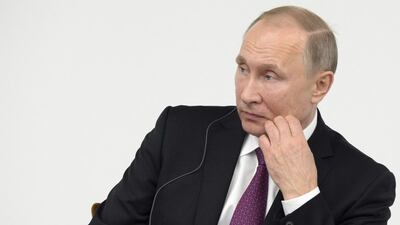As 2016 draws to a close, Vladimir Putin can look back with satisfaction on a year in which Russia’s quest to reassert itself scored some notable successes.
In the face of sanctions intended to punish Russia for what the US and some of its European allies saw as Moscow’s disruptive meddling in Ukraine, Mr Putin has maintained his grip on Crimea while Russian-backed separatist regions in the east of the country continue to defy Kiev. In Syria, the collapse of rebel resistance in Aleppo signals the successful outcome of a military intervention aimed at bolstering Bashar Al Assad’s regime. Mr Putin can now plan his next steps fully aware that the western powers have been sidelined in Syria and are showing signs of disunity over Ukraine.
Although the EU voted to renew its sanctions against Russia, the Kremlin is likely to be confident that it can bide its time while Donald Trump formulates his foreign policy goals and several major European countries are preoccupied with internal elections.
Moscow will observe with particular interest the outcome of the French presidential race in May 2017. The two candidates expected to contest the final run-off round of the election, the National Front’s Marine Le Pen and the centre-right republican François Fillon, are both more sympathetic to Russia than is François Hollande. The Kremlin will hope that a new French government will seek to moderate German chancellor Angela Merkel’s hard line on the current sanctions regime.
Russia’s economy is in urgent need of respite. It is estimated that Russia’s national reserves have been depleted by as much as two thirds to $30 billion since Ukraine crisis erupted in March 2014. The finance ministry has had to sell off large quantities of foreign currency in order to balance the budget.
In addition, Credit Suisse estimates that Russian living standards declined by nearly 15 per cent between mid-2015 and mid-2016. It is likely that as many as one in six Russians now live in poverty. While Mr Putin continues to achieve approval ratings as high as nearly 90 per cent, survey evidence suggests that many Russians are disenchanted with rising inflation and unemployment.
Although presidential elections should pose no threat to Mr Putin’s dominant position in Russia, the Kremlin will continue to use its foreign currency reserves and loans to maintain current expenditure. But it is likely that hard decisions will soon be unavoidable. Many state-own corporations are being propped up with public funds. In addition, military operations in Syria are costing the equivalent of hundreds of millions of dollars every month. Consolidating Moscow’s hold on the disputed territory of Crimea through spending on social services and infrastructure is another drain on reserves to the detriment of budget allocations for other needy regions in Russia.
The ailing economy will be factored into the Kremlin’s calculations over future policy in Syria. For all its influence over Damascus, Russia does not have the power to impose a final settlement in Syria. While air strikes helped defeat the rebels in Aleppo, Iranian forces bolstered by Hizbollah and Iraqi Shia militias played the decisive role. Although Russia and Iran have worked closely to shore up the regime, Mr Putin remains wary of forging too close an alliance with Tehran given Moscow’s interests in building on its military relationship with Egypt and energy cooperation with Saudi Arabia.
Having won in Aleppo, Mr Putin is now looking to lead peace talks aimed at some form of political solution to the Syrian conflict. The Kremlin has announced that it will work with the Turkish government to host ceasefire talks between the Damascus government and opposition factions in Astana, the Kazakhstan capital. Although Mr Putin has stressed that his initiative is intended to run as a parallel process to the UN-led talks in Geneva, his exclusion of the US and its allies from the talks is a deliberate rebuke aimed at highlighting the marginalisation of Washington in Syria.
The principal obstacle to the joint Russian-Turkish démarche is that the rebellion is by no means over. Moderate and extremist rebel groups still control a significant proportion of Syria’s territory and insurgents may now seek to wage hit-and-run attacks rather than allow themselves to be drawn into intense urban fighting again. ISIL’s recent reoccupation of Palmyra demonstrates the continued inability of the Syrian government’s military to effectively combat rebel forces without Russian air power and Iranian ground forces.
Although the West has accused Moscow of playing a cynical role in Syria, Mr Putin’s opportunist approach has successfully exploited policy discord in the US and Europe. Despite his evident successes, however, the Russian president may ponder the advantages of de-escalating tensions over Ukraine and Syria.
While Russia’s strength has waxed in proportion to the waning of the West’s unity and resolve, Mr Putin ambitions could be increasingly frustrated by the very real constraints on Russia’s ability to project power beyond its “near abroad”. The advent of the Trump administration in Washington, combined with political changes in Europe, may offer Moscow a tempting and timely opportunity to restore relations with the US and its allies before a struggling economy undermines Russia’s renewed great power status.
Stephen Blackwell is an international politics and security analyst

